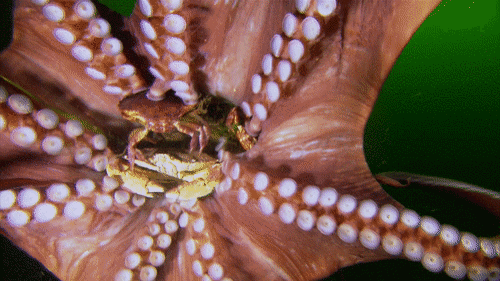BIOL630 TERM PROJECT

NUTRITION AND DIET
For the octopus, a few different factors go into what they ingest. These cephalopods are aquatic predators, with many options to include in their diet, such as crabs, clams, snails, shrimp and fish (LiveScience). Most octopuses, when studied individually as they were in the Bahamas in 2014. The researchers describe it as “a generalist population made up of specialists” (Kuhlmann and McCabe, 2014). More than half of the individuals surveyed ate a significant amount of the same type of prey, and this special prey varied depending on the location. As a whole, the octopuses have a varied diet, but individually, they have a selected prey of choice.

An octopus consuming
a crab (courtesy of Reddit)
However, depending on the availability of prey in the waters they inhabit, varying their diet could be necessary for survival. A study in 2011 looked at how octopuses make choices in their prey that benefit their energy expenditure. When given the choice between a crab and a clam, the crab was chosen over the clam three times more often. This was interesting to the researchers, because the clam provides about “10 times more energy per unit time” than the crab does (Onthank and Cowles, 2011). So why choose the crab over the clam? A possible reason for this is the preference for a mobile prey since clams are immobile.
Although octopus are generally predators, they also exist in the food chain as prey, namely to humans. Those in the aquacultural industry have researched in depth about what kind of diet best increases growth for different species of octopuses. A study from 2006 looked at how a diet that consisted of crab and bogue, which is a type of fish found in the Atlantic with 6% lipid content, would provide the most nutritional value for the octopuses they were farming. The researchers compared a 100% crab diet, a 100% bogue diet, and a mix of different patterns of feeding, such as crab for 3 days followed by bogue for 1 day and vice versa. The results were interesting – the octopuses fed exclusively crab weighed double after this study than the octopuses only fed bogue. It also took the group that exclusively ate crab only 95 days to gain 3 kg, whereas for the other groups, it took closer to 100 days and upwards to gain this much (García García and Cerezo Valverde, 2006).

An octopus consuming a crab.
Gif courtesy of Tumblr.
Original video linked here.
This study clarified how although a diverse diet for an octopus is sometimes necessary depending on their environment, the protein gained from ingesting crab is more valuable for growth than the lipid content found in the fish. They even go on to mention how lipid requirement for cephalopods like octopuses is “low”, but still necessary for cell membranes, steroids, and hormones (García García and Cerezo Valverde, 2006).
Image above courtesy of American Oceans